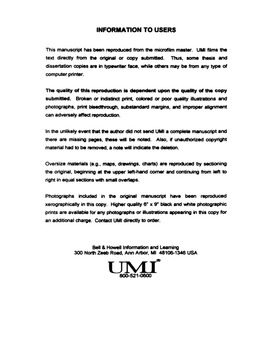| dc.contributor.advisor | Fleener, Jayne, | en_US |
| dc.contributor.author | Ahmadifar, Gholam H. | en_US |
| dc.date.accessioned | 2013-08-16T12:30:49Z | |
| dc.date.available | 2013-08-16T12:30:49Z | |
| dc.date.issued | 2000 | en_US |
| dc.identifier.uri | https://hdl.handle.net/11244/5921 | |
| dc.description.abstract | Especially important to the findings of the study was the establishment of an environment for positive change in the students' performances by having the culture circle group meetings. The impact of the culture circle similarly affected their beliefs about and strategies associated with their individual mathematics learning and preparation. Unfortunately for several participants, prior poor study habits and lack of value for mathematical achievement prevented them from achieving high levels of competence in their Algebra II class. Individual and group reflectivity contributed greatly to their understanding and belief about themselves as mathematics learners. The use of culture circles clearly needs further investigation and implications of this research include the need to explore cultural and power relation with their impact on solving and confidence in mathematics learning. | en_US |
| dc.description.abstract | The intensity of the interactions during the second phase of the data collection process contributed to the establishment of a foundation for the data collection process. Data from transcription of the classroom observations, individual interviews, culture circle meetings, interviews with the teacher, and the students' responses to survey questions were analyzed using a constant comparative method (Lincoln & Guba, 1985) and Freire's Circle of Culture Method (Shor, 1987). | en_US |
| dc.description.abstract | There were weekly culture group meetings for approximately two hours in which the participants discussed ideas about mathematics frustration, stereotype threat, and anxiety. Also, the group discussed experiences in mathematics classes. These sessions were tape-recorded. | en_US |
| dc.description.abstract | This study is an attempt to understand the impact of culture circle on African American high school students in Algebra II. Particular attention was given to the view of the male African American students, age sixteen to eighteen. | en_US |
| dc.description.abstract | The data collection process occurred in two phases. The purpose of the first phase of the study was to gather background information, which included the researcher attending the Algebra II class three times a week for six weeks. During the second phase, which lasted approximately eight weeks, the researcher observed the participants in the classroom and interviewed them individually every week for approximately one hour to discuss their beliefs and actions related to their learning mathematics and confidence. | en_US |
| dc.description.abstract | Eight students volunteered to participate in this study in the fall semester of 1999. The guiding questions were: (1) How do these minority students perceive themselves as learners and doers of mathematics? (2) How do minority students feel about themselves and negative group stereotype threat pertaining to their mathematics learning? (3) What is the impact of culture circles focused on mathematics values, meanings and goals? | en_US |
| dc.format.extent | xii, 112 leaves : | en_US |
| dc.subject | Mathematics Study and teaching (Secondary) United States. | en_US |
| dc.subject | Psychology, Social. | en_US |
| dc.subject | African American high school students. | en_US |
| dc.subject | Education, Mathematics. | en_US |
| dc.subject | Education, Secondary. | en_US |
| dc.subject | Sociology, Ethnic and Racial Studies. | en_US |
| dc.subject | African American teenage boys. | en_US |
| dc.title | Impact of culture circles on minority high school students in mathematics. | en_US |
| dc.type | Thesis | en_US |
| dc.thesis.degree | Ph.D. | en_US |
| dc.thesis.degreeDiscipline | Department of Instructional Leadership and Academic Curriculum | en_US |
| dc.note | Adviser: Jayne Fleener. | en_US |
| dc.note | Source: Dissertation Abstracts International, Volume: 61-02, Section: A, page: 0536. | en_US |
| ou.identifier | (UMI)AAI9962950 | en_US |
| ou.group | Jeannine Rainbolt College of Education::Department of Instructional Leadership and Academic Curriculum | |
